|
March 29, 2018
Carleton Education Workers Continue
Battle to
Defend Defined Benefit Pensions
Fight for Canadian Standard
Pensions for All!
PDF
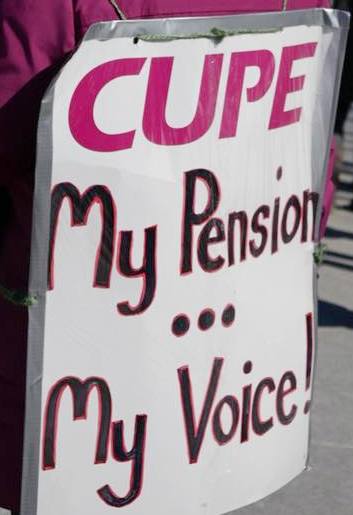 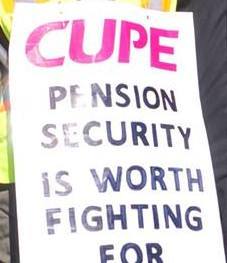 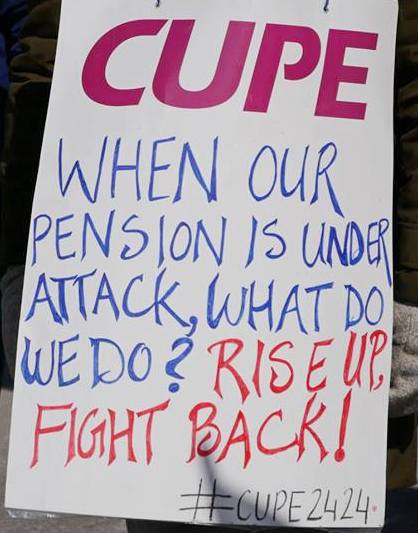
Carleton
Education
Workers
Continue
Battle
to
Defend
Defined
Benefit
Pensions
• Fight for Canadian Standard Pensions for All!
• Theft of What Belongs to Workers by Right
Lockout at Aluminerie
de Bécancour in Quebec
• Strong Support from Metallurgical
Workers
Iron Ore Company Workers on Strike in Labrador
• Workers Demand End to Two-Tier Conditions
Drug Testing of
Workers at Suncor in Alberta
• Court of Appeal Upholds Injunction Against
Random Drug and Alcohol
Testing - Peggy Askin
The Need to Speak Out
Against Trudeau Government's Transportation Reforms
• Nation-Wrecking to Serve Global Cartels
Carleton University Workers Continue
Battle to
Defend Defined Benefit Pensions
Fight for Canadian Standard Pensions for All!
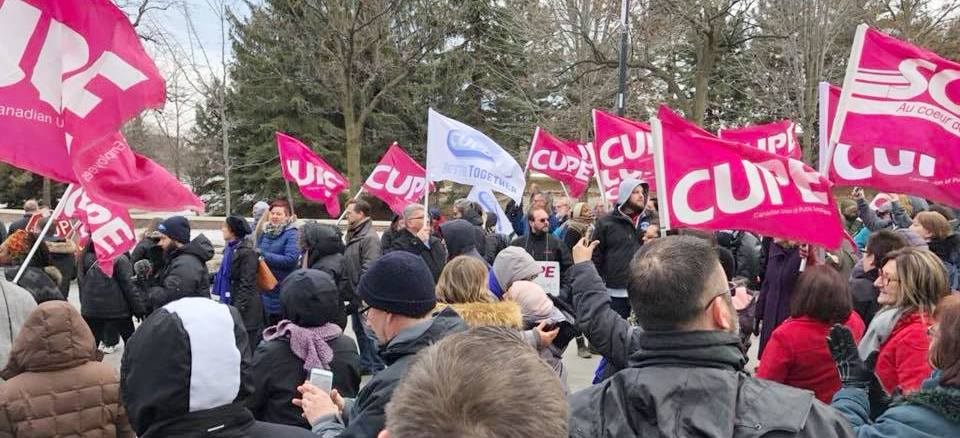
Solidarity picket at Carleton University, March 17, 2018.
Eight hundred administrative, technical, and library
staff at Carleton University in Ottawa are continuing their strike to
defend their defined benefit pension plans. Their pension plan has
endured cut after cut in recent years to the point its quality as a
pension plan is threatened. They launched their strike action on
March 5 to stop the
university administration from doing additional harm to their defined
benefit pension plan.

Similar to other workplaces, Carleton University
workers are confronted with administrative actions to eliminate their
guaranteed defined benefit pension plan and force them to switch to a
savings plan. The regressive change also includes the fraud of linking
pension plans to deductions from wages.
The present direction of the economy is leaving many
workers without security in retirement. The basic Canada Pension Plan
is wholly inadequate to guarantee a retirement at a standard that most
in society would find acceptable.
Pensions are under attack
throughout the imperialist system of states. The oligarchs and their
representatives in government who control the socialized economy are
increasing their attacks to expropriate for themselves the value
workers need to retire at a standard required by the society they live
in. In response to the
anti-social offensive on pensions, the working class is
engaged in actions to defend the pensions it has and fight for Canadian
standard pensions for all.
Stand with Carleton Workers in Their
Just Struggle to Defend Their
Defined Benefit Pensions!
Fight for Canadian Standard Pensions for All!
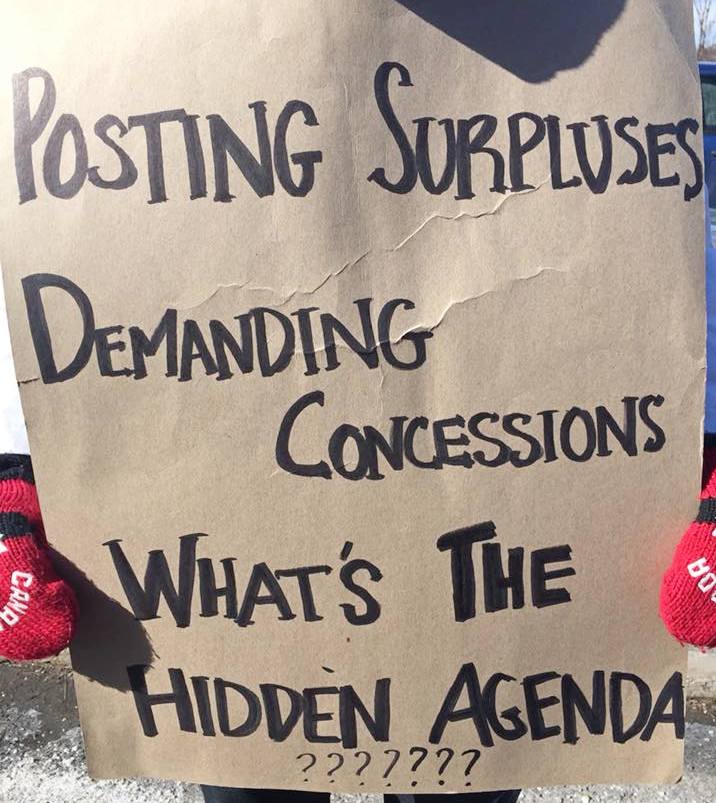 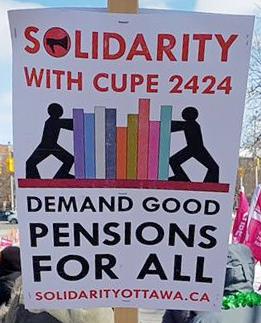 
University Lecturers in Britain Face Similar Situation
Similarly, university lecturers in Britain,
members of
the University and College Union (UCU) are engaged in a strike struggle
to defend their pensions. Lecturers are confronting proposed changes to
their pensions, which they say could leave them up to $18,000 a
year worse off in retirement. A report in Workers' Weekly
writes,
"The employers, Universities UK, want to change the Universities
Superannuation Scheme from a defined benefit scheme -- giving a
guaranteed retirement income -- to a defined contribution scheme, where
their pensions would be subject to changes in the stock market. Younger
lecturers would be worst affected, says the union, with some losing up
to half their pensions. As a result, lecturers at 64 universities
struck work over pensions."
Workers' Weekly also cites another example of
the growing assault on the right to defined benefit pensions. The BT
Group plc, formerly British Telecom, is an investment cartel that owns
British Telecommunications plc with over 106,000 workers. The
paper writes, "BT launched a formal 60-day consultation on
proposed changes to the company pension scheme on November 15 last
year. The Communication Workers' Union (CWU) has not reached agreement
on any of the proposals. BT's proposals could radically change pension
provision across the company with pension scheme members affected by
proposals that the union believes fail to
provide decent pension provision in retirement. The CWU is urging
members to firmly say No to
all of BT's proposals for both schemes."

Theft of What Belongs to Workers by Right
Many companies use bankruptcy protection or insolvency
to destroy and expropriate defined benefit pension plans and other
post-employment benefits. In some cases, the bankruptcy/insolvency may
be totally lacking in legitimacy. The list of such companies is long
and growing with one of the most recent egregious examples being the
Sears Canada bankruptcy that recently left long-time Sears workers
without jobs and severance pay, many suppliers and contractors without
payment, and retirees and those eligible for retirement benefits in a
state of insecurity and worry over their pensions.
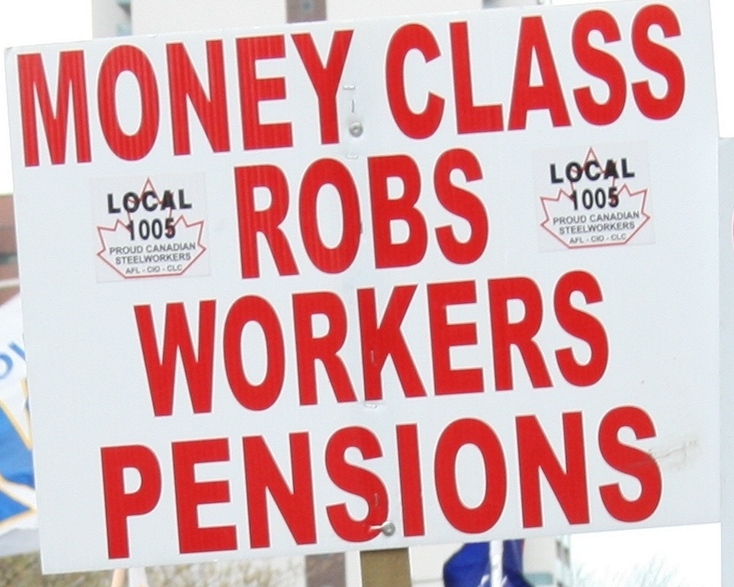
Throughout the imperialist
system of states, company bankruptcies are a source of great danger for
the economy and workers' current employment and pensions. Global
investment cartels and consortiums commonly control even the largest
companies through a combination of ownership of equity and debt. Using
their control, an investment
cartel can drain a company it controls of social wealth by paying
dividends to the ownership cartel and suffocating the company in
secured debt to itself, which during bankruptcy are given a higher
priority than other claims. When a default is triggered, the added
bonus for the oligarchs is the elimination of responsibility towards
pensions,
environmental remediation and even much of the payments due to
suppliers, contractors and unsecured debt.
Stelco steelworkers are familiar with this scenario.
First there was 2004 CCAA fraud where Stelco was stripped of its assets
and the bankruptcy vultures made a big score by selling to U.S. Steel.
Then, U.S. Steel followed the playbook with additional features of
turning Stelco operating investments into debt to itself, making off
with Stelco's most lucrative steel customers, and destroying the
defined benefit pension plan for new hires. The investment cartel that
seized control from U.S. Steel through the Companies' Creditors Arrangement Act
(CCAA) also rid itself of much of Stelco's legacy responsibilities
toward pensions, other post-employment benefits and environmental
remediation.
The oligarchs who control the socialized economy
consider benefit promises owed to workers through pension plans and
other arrangements not to be inalienable rights but company liabilities
that can be eliminated through legal manoeuvres. This anti-social
outlook in control of the economy does not recognize workers' claims on
the social
wealth they produce as legitimate and inviolable. The anti-social view
considers pensions and post-employment benefits as fair game to be
destroyed as collateral damage when a business goes bankrupt using the
existing legal means such as the CCAA in Canada and Chapter 11
bankruptcy in the United States.
 Workers in response declare
their claims come legitimately through their work in producing all the
value society needs for its existence and should be inviolable and not
subject to legal elimination. Workers' capacity to work is sold within
the socialized economy with the expectation that the exchange will
guarantee workers' security and
well-being from birth to passing away. Without a guarantee of this from
those who purchase their capacity to work the exchange becomes a
criminal fraud requiring a new arrangement. Workers in response declare
their claims come legitimately through their work in producing all the
value society needs for its existence and should be inviolable and not
subject to legal elimination. Workers' capacity to work is sold within
the socialized economy with the expectation that the exchange will
guarantee workers' security and
well-being from birth to passing away. Without a guarantee of this from
those who purchase their capacity to work the exchange becomes a
criminal fraud requiring a new arrangement.
With the refusal of the ruling oligarchs to recognize
the claims of the working people as legitimate and inviolable, the
outlook of the ruling elite exposes itself as a slave-owning mentality.
The dominant outlook regards workers' capacity to work and the social
value it creates as the private property of those who bought the
capacity to work
and control the socialized economy. In their mind they separate the
capacity to work from the human person doing the work. They own the
capacity to work and the social product it produces while the human
persons doing the work have no rights either to control their work or
the social wealth they produce.
In words, the worker has no rights but is not a slave;
while in deeds, the worker has no rights just like a slave. Those who
own and control the productive forces including the capacity to work of
those who do the work and the labour market from which they sell
themselves, in practical terms, own and control the workers themselves,
their fate
and the social product they produce. Such is the contemporary form of
human slavery and the legal system that protects it.
Presently the claim on social wealth promised to
workers in return for their capacity to work is subject to the laws of
private ownership and control of the socialized productive forces of
industrial mass production. Those laws serve the ruling elite and their
class privilege, their continuing control, and their domination within
the social relation
with the working class. Those laws and property arrangements do not
serve the workers who produce the value through their work on the
socialized means of production. These outmoded arrangements and social
relation are from an earlier era and are now in antagonistic
contradiction with those who do the work and the modern productive
forces,
which are completely socialized.
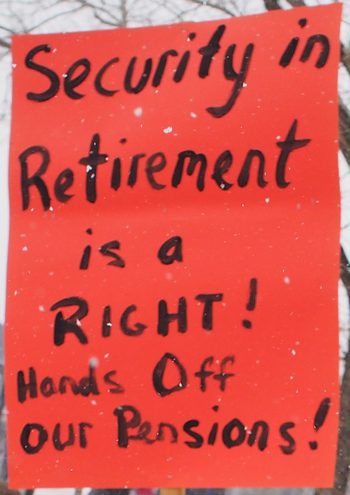 Much of the value workers
create and put into pension plans in one form or another, no longer
exists in any tangible way upon retirement. The social value has
already been realized and consumed in multiple transactions within the
economy. When it comes to realizing the value promised as a pension
benefit, the value must be created anew
by current workers active in the economy. And that is the rub. The rich
oligarchs in control are loathe to part with any part of the new value
workers produce, even that saved in pension plans, which may still
exist. Their aim is to expropriate as much of the new value as possible
to serve their own private interests. They do everything to deny
workers their right to a society standard pension because such a
pension requires new value, which the oligarchs want to expropriate for
themselves. They unleash corporate bankruptcies, company flipping and
legalized police powers of the state to prevent workers from organizing
and waging an effective struggle for their rights including their right
to security in retirement. Much of the value workers
create and put into pension plans in one form or another, no longer
exists in any tangible way upon retirement. The social value has
already been realized and consumed in multiple transactions within the
economy. When it comes to realizing the value promised as a pension
benefit, the value must be created anew
by current workers active in the economy. And that is the rub. The rich
oligarchs in control are loathe to part with any part of the new value
workers produce, even that saved in pension plans, which may still
exist. Their aim is to expropriate as much of the new value as possible
to serve their own private interests. They do everything to deny
workers their right to a society standard pension because such a
pension requires new value, which the oligarchs want to expropriate for
themselves. They unleash corporate bankruptcies, company flipping and
legalized police powers of the state to prevent workers from organizing
and waging an effective struggle for their rights including their right
to security in retirement.
The Trudeau Liberal government, for example, is not
likely to permit the adoption of the private member's bill tabled in
the House of Commons by Hamilton federal MP Scott Duvall. The bill
moves workers' claims to the top of the pack when settling corporate
bankruptcies under the CCAA. The Trudeau Liberals say putting workers'
pension claims on
bankrupt corporate assets ahead of owners of secured debt would inhibit
the global investment cartels from investing in Canada. This reveals
the slave mindset of the Liberals who are opposed to having the human
factor/social consciousness recognized as the fundamental basis for
modern social relations even though the economy and its productive
forces are completely socialized. For the Liberals and others of their
ilk, property rights trump human rights.
Corporate Bankruptcies
Bankruptcies are a common occurrence
disrupting the economy and workers' lives and rights. Overall corporate
bankruptcies in the United States increased to 23,157 companies in
the fourth quarter of 2017 alone from 23,109 companies in the
third quarter of 2017. Many of these bankruptcies are companies
controlled within a much larger investment cartel or consortium.
Toys "R" Us with 64,000 workers is controlled by a
consortium of Bain Capital Partners LLC, Kohlberg Kravis Roberts (KKR)
and Vornado Realty Trust. Remington Outdoor with 3,000 workers is
controlled by Cerberus Management. They are but two of the latest
bankrupt companies with tens of thousands of retirees.
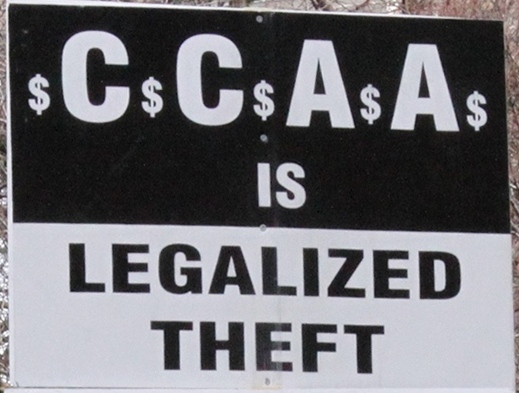 Sears Canada
declared bankruptcy while under the control of an investment cartel in
the United States. Prior to bankruptcy, the controlling U.S. cartel
drained Sears Canada of social value through well documented dividend
payments. The social wealth that Sears workers generated prior to
bankruptcy did not go towards topping up
the pension fund and for necessary investments to renew the Sears
retail operation in Canada, but was siphoned off as dividend payments
in a completely legal manner according to the state-imposed laws of
private ownership of socialized property. Sears Canada
declared bankruptcy while under the control of an investment cartel in
the United States. Prior to bankruptcy, the controlling U.S. cartel
drained Sears Canada of social value through well documented dividend
payments. The social wealth that Sears workers generated prior to
bankruptcy did not go towards topping up
the pension fund and for necessary investments to renew the Sears
retail operation in Canada, but was siphoned off as dividend payments
in a completely legal manner according to the state-imposed laws of
private ownership of socialized property.
The slave outlook of the oligarchs refuses to change
the laws governing private ownership of socialized property because
they are the owners of the economy and those laws and police powers and
the social relation they sustain guarantee their class privilege and
control. This raises the issue of the necessity for the working people
to organize
to bring about a change in the direction of the economy that puts
themselves, the actual producers who do the work, in control so that
their lives, security and well-being are guaranteed from birth to
passing away.
The present system of private ownership of parts of the
socialized economy is a contradiction crying out for resolution. The
contradiction is unstable and wrought with danger not only for the
actual producers but for the extended reproduction of the economy
itself. Socialized productive forces need social relations and
ownership and control in
conformity with their socialized nature. The working people who do the
work and produce the social product should control the socialized
productive forces for the common good of all, with all the many parts
of
the economy working cooperatively without rancour and crises.
To allow the economy to run amuck as it now does with
recurring crises, bankruptcies and denial of rights causes hardship
amongst the working people and destruction of the productive forces.
The direction is unacceptable and working people are charged with the
responsibility to change it. The working people themselves must bring
the
economy under conscious pro-social control to serve the people. The
contradiction between the socialized productive forces of industrial
mass production and the outmoded social relations dominated by the rich
and their class privilege must be resolved for the good of all humanity.

Lockout at Aluminerie de Bécancour
in Quebec
Strong Support from Metallurgical Workers
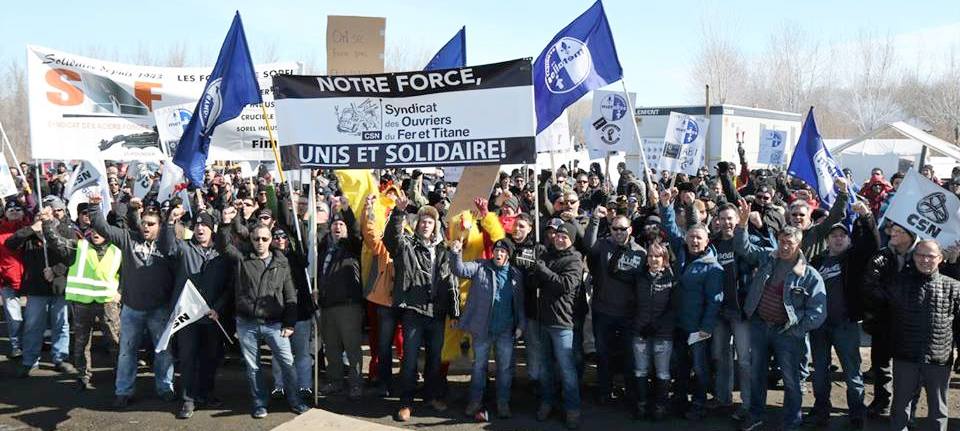
March 23, 2018 contingents from many union locals visited the
locked-out
workers in Bécancour, bringing their solidarity and financial
support.
Actions in support of the workers currently locked out
at the Aluminerie de Bécancour (ABI) are stepping up, especially
since the company liquidated the mediated bargaining on March 8, and
withdrew their January 10 offer. The arbitrary actions of the company
have further convinced workers, not only at ABI but elsewhere across
Quebec and Canada, that the Alcoa-Rio Tinto cartel has a hidden agenda
behind its refusal to negotiate, one which is detrimental to the
workers, the population of Mauricie-Centre-du-Québec and the
society as a whole. The workers demand that ABI sit down with them to
negotiate a collective agreement that they would consider acceptable.
Last week, workers in metallurgy and other sectors went
to the ABI picket lines to support the locked out workers. Workers also
provided financial support ranging from lump sums to weekly or monthly
donations that will be given until the end of the conflict to support
the fight of the ABI workers against the intransigence of the Alcoa-Rio
Tinto cartel. Amongst the metallurgical workers who came from
Montérégie (on Montreal's south shore) were the
ArcelorMittal
workers of Contrecoeur-East, Contrecoeur-Ouest and Longueuil, workers
from Rio Tinto Metal Powders and Iron and Titanium plants in
Sorel-Tracy, and many others. Many of them are members of the
Inter-Union
Committee of Sorel-Tracy that is made up of Steelworkers and CSN unions
that was founded in October 2016 by industrial unions to work
together on issues that affect workers across the region and to provide
all possible support when the workers undertake actions in defence of
their rights and against attacks from the employers. When the
workers visited the locked out ABI workers, they made brief speeches in
which they highlighted that the fight of the ABI workers against the
attacks of the Alcoa-Rio Tinto cartel is the fight of the working class.
 
  
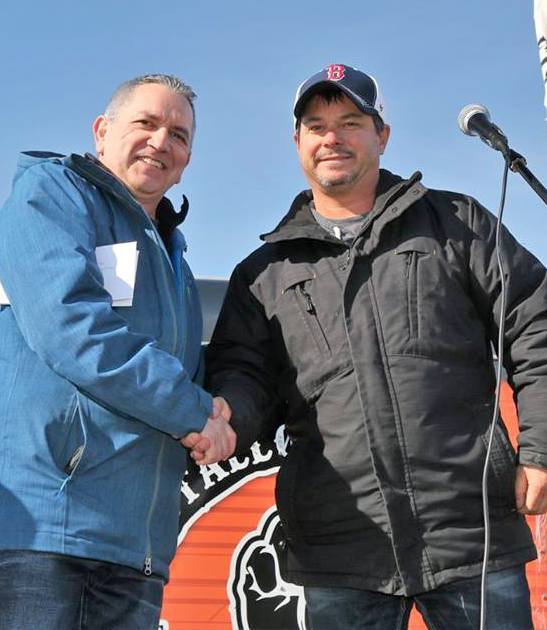  
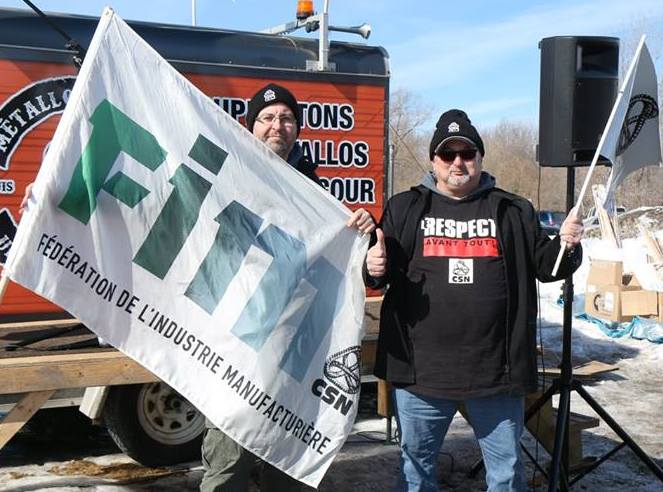 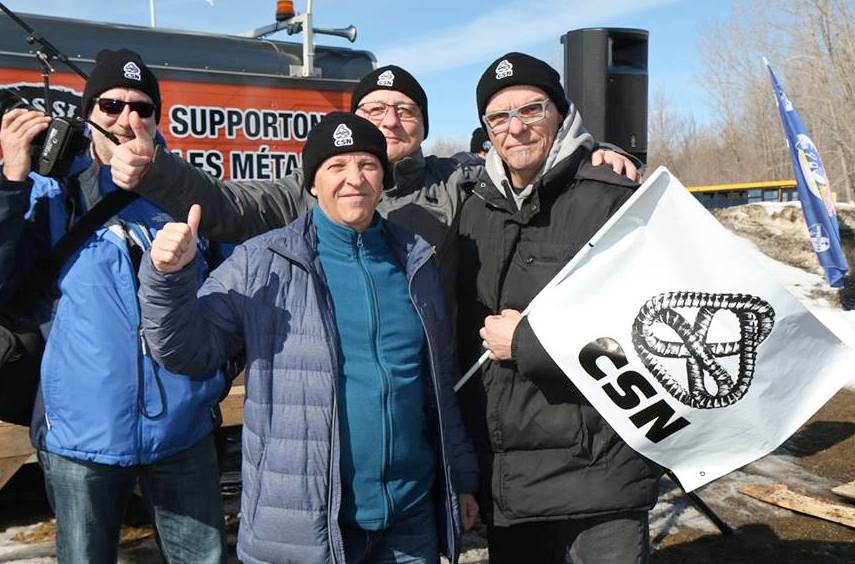
"With this financial support we are bringing to you,
our members wanted to demonstrate that your cause is shared by all
other workers who fight against the intransigence of the multinational
corporations that have decided to ignore our concerns," said
François Nadeau, President of the Union of Iron and Titanium
Workers (CSN).
"We have been closely following your dispute. This is
an issue that affects everyone, the whole working class actually. Your
fight makes a big difference for everyone," said Jean-François
Gilbert, President of the Alstom Workers' Union, Renewable Energy (CSN).
 "We have decided to come to
support your fight, because no matter the flag, whether it be
Steelworkers, CSN, Unifor, no matter the region, when there is a group
that is involved in a fight, it becomes everyone's fight," said Steve
Galibois, President of United Steelworkers Local 6586, representing the
workers at ArcelorMittal, Contrecoeur-East. "We have decided to come to
support your fight, because no matter the flag, whether it be
Steelworkers, CSN, Unifor, no matter the region, when there is a group
that is involved in a fight, it becomes everyone's fight," said Steve
Galibois, President of United Steelworkers Local 6586, representing the
workers at ArcelorMittal, Contrecoeur-East.
Alain Croteau, Director of the Quebec district of the
United Steelworkers (Syndicat des Métallos) also went to
Bécancour to announce that the union is
renting a bus to go to Pittsburgh on May 9 to denounce Alcoa's
actions at the Alcoa shareholders' meeting. The Steelworkers will
also tour the Alcoa factories in the United States and are establishing
links with unions in
various countries to hold Alcoa and Rio Tinto accountable for their
attacks on the workers of Bécancour and workers across the world.
Croteau also mentioned that the Syndicat des
Métallos had posted a clock on their website showing the amount
of money that Hydro-Québec is losing because of the lockout. "On
our website, we have put the number which shows how much money
Québécois people have lost due to the lockout by
Alcoa-Rio Tinto. Second by second, we can follow the huge loss that
Hydro-Québec is incurring as the Aluminerie de Bécancour
does not have to pay for the energy that is put aside for the company.
"The meter is running and now is up to $45 million and
the company is
not being forced to pay since the lockout is considered a 'force
majeure' according to the agreement which binds the government,
Hydro-Québec and the company," Croteau said.
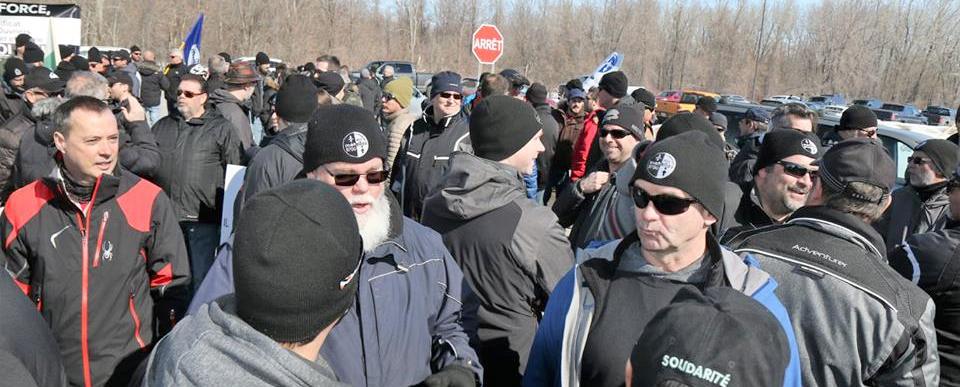

Iron Ore Company Workers on Strike in
Labrador
Workers Demand End to Two-Tier Conditions
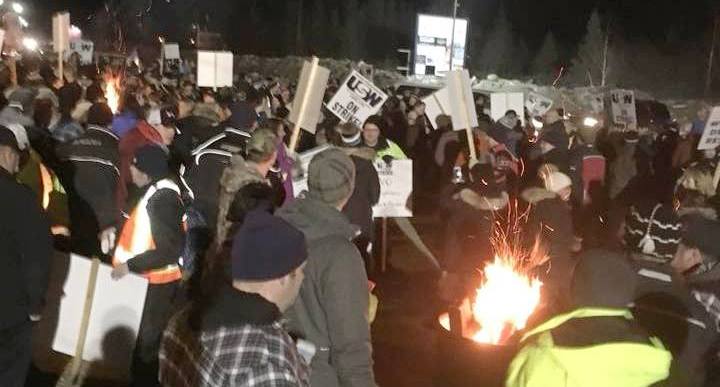
Around 3:00 am on March 27, the close to 1,400 workers
of Iron Ore Company of Canada (IOC) in Labrador City went on strike.
They
walked out mainly to oppose IOC employing a "temporary workforce"
side-by-side with permanent workers doing the same work under
drastically inferior working conditions. The workers do not accept that
a mining giant such as IOC should force a section of workers to labour
under substandard conditions. The strike vote took place Monday, March
26 in two membership meetings of United Steelworkers Local 5795, one in
the morning and one in the evening, in which workers voted on the
latest company offer.
"We
had
92.5
per
cent
of
the
workers
voting,
which
is a huge turnout, and
we had 91.1 per cent voting for a strike," Local 5795 President Ron
Thomas told Workers' Forum.
"Our members are upset. The company never
sat down and negotiated with us and they never took us seriously. The
biggest issue right now is the temporary workforce. Our members do not
want it. They do not want to have workers coming in and doing the exact
same job working side-by-side but with no benefits. This is a step
backwards. We agreed to a temporary workforce in a very specific period
when times were rough. Right now times are better and we feel that
everybody that works at IOC should be getting the same treatment."
Thomas
informed
Workers' Forum
that the company dropped its demand to impose a
defined contribution plan for new hires instead of having them on the
same defined benefits plan that workers currently have. "The smartest
thing for the company to do is to get back to negotiations soon so we
can put this behind us and go back to producing. If not we are willing
to stay out as long as it takes. Our picket lines are up and there is
very strong morale on the picket lines."
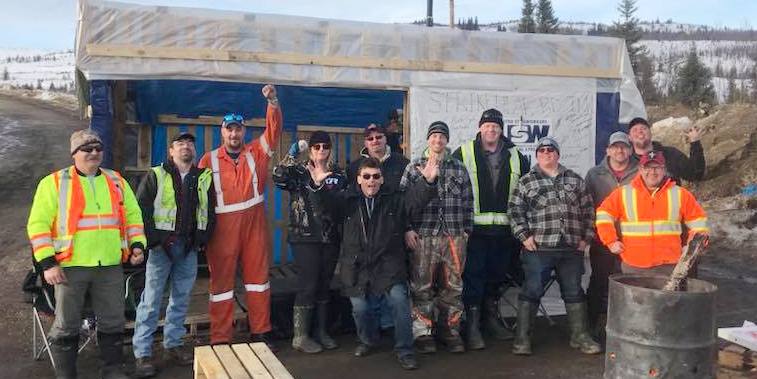
Workers who form the "temporary workforce" do not work
regular schedules. The company moves them around at whim to different
shifts and production areas in a way that is detrimental to their
health and safety. They have fewer benefits than the other workers.
They have no guarantee of being called back by the company once they
finish the job. IOC presents this temporary work as an exciting
opportunity to work under non-standard conditions. This temporary
precarious work force is hired within a work environment that is
already marked by workers' extreme fatigue and by hazardous conditions.
According to IOC, the creation of a temporary work force is an "effort
to increase workplace flexibility and meet the needs of the business."
Temporary workers become a "readily available workforce who are highly
motivated, adaptable to changing situations and priorities, can
interact well with others and demonstrate both the ability to work
independently and to contribute effectively within a team." In other
words, a disposable and precarious workforce for whom all rights are
negated.
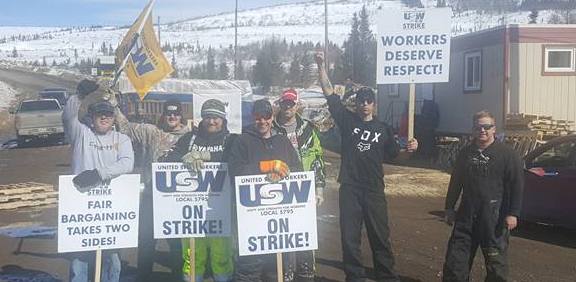
The IOC workers in Quebec, in Sept-Ìles on the
North Shore, are voting on the same offer on Wednesday, March 28
and Thursday, March 29.
At IOC's complex in Labrador, workers mine iron ore
which is then concentrated and pelletized and prepared for transport by
rail 418 kilometres to the port of Sept-Îles for shipping to
steel plants worldwide. IOC is operated by Rio Tinto Ore Group and is a
joint venture among Rio Tinto (58.7 per cent), Mitsubishi Corporation
(26.2 per cent) and Labrador Iron Ore Royalty Income Corporation (15.1
per cent).

Drug Testing of Workers at Suncor in
Alberta
Court of Appeal Upholds Injunction Against
Random Drug and Alcohol Testing
- Peggy Askin -
Workers represented by Unifor Local 707A at Suncor in
the Alberta oil sands, have once more succeeded in blocking random drug
and alcohol testing by their employer.
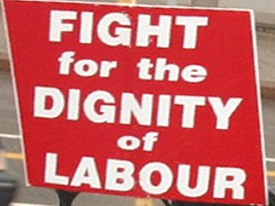 Ken Smith, President of
Unifor Local 707A said, "We're talking about a person's dignity
and their personal rights. It's intrusive, and we haven't seen any
proof that this would make a safer work environment. It would be a
strike against human rights for workers across Canada for sure to say
you must open yourself up for random
testing." Ken Smith, President of
Unifor Local 707A said, "We're talking about a person's dignity
and their personal rights. It's intrusive, and we haven't seen any
proof that this would make a safer work environment. It would be a
strike against human rights for workers across Canada for sure to say
you must open yourself up for random
testing."
The company has been trying to impose random testing
since 2012. Local 707A won an arbitration blocking random
testing, but Suncor challenged the ruling and the court ordered a new
arbitration. The union then obtained an injunction against testing
until a new arbitration is held, and Suncor challenged the injunction.
In the
latest development, on February 28 the Alberta Court of Appeal
upheld the injunction. The union has also sought leave to appeal to the
Supreme Court.
In Communications, Energy and Paperworkers Union of
Canada, Local 30 v. Irving Pulp & Paper Ltd., 2013
the Supreme Court ruled that random testing is warranted only if the
employer establishes there is a "general problem" with drug or alcohol
use in the workplace.
Suncor says there is a "general problem" based on
evidence regarding all workers on the site, including those working for
contractors mainly during construction, and in the camps where these
workers live. At the time of the initial grievance, there were
approximately 10,000 workers on the Suncor site, 3,383 of
whom were
permanent employees represented by Local 707A. Local 707A has
argued that Suncor has failed to provide evidence that there is a
problem with the workers it represents.
Suncor already conducts pre-employment, post-incident
and reasonable cause testing. It argues that an infringement on the
right to privacy and dignity is necessary in order to balance safety
and rights. This argument is absurd because it is the workers and their
union who are defending the right to a safe workplace and the right to
privacy and dignity for the human person.
Suncor also states that it is not trying to regulate
what workers do when not at work, but only whether they are "Fit for
Duty." Yet it is leaving no stone unturned in its demand that workers
submit to testing which has no relevance to that issue. All the expert
witnesses involved in the dispute have agreed that a "non-negative"
drug test
provides no evidence of whether a person is impaired, and in particular
that indications of cannabis use can be present for several days and
sometimes longer. Despite this, workers who have had a "non-negative"
post-incident test have been forced to declare they have a "drug
problem" and go into rehabilitation in order to keep their jobs.
Suncor's argument is based on its records of incidents
involving both permanent Suncor employees -- union and non-union -- and
workers employed by contractors including construction and periodic
maintenance (turnarounds). Incidents include both the worksite and the
camps where the non-permanent workforce live. Alcohol and drugs are
prohibited in Suncor's camps, with sniffer dogs and handlers used
to search for prohibited substances, a practice later extended to the
work sites. Thus an "incident" could be as trivial as a bottle of beer
in a worker's room, or could pertain to the use of cannabis or alcohol
during time off work.
Twenty fatalities have taken place at Suncor. The
deaths of three workers, none of whom were Suncor employees, were
associated with the use of drugs or alcohol. Only one of these workers
was actually working when he died. One was in the work camp, and
another was on site without authorization and not at work.
Over the nine-year period for which Suncor offered
statistics, there were an average of 24 non-negative tests per
year involving workers represented by Local 707A, or slightly more
than 0.5 per cent of the workers. More than half of all non-negative
tests involved cannabis, which means they have no relevance to whether
a worker
was impaired. A non-negative test could also indicate a blood alcohol
level significantly below a legal impairment level.
Why is Suncor intent on this crusade instead of dealing
with the real causes of accidents and deaths at its work sites,
especially in light of the terrible fact that twenty workers have died
on the Suncor site? Blaming workers for safety violations is part of
the arsenal of the monopolies to divert attention and evade
responsibility for the injury and
death of workers. Suncor must be held accountable for the conditions at
its work sites. Using safety as a pretext to violate the right to
privacy and dignity must not be permitted.

The Need to Speak Out Against Trudeau
Government's Transportation Reforms
Nation-Wrecking to Serve Global Cartels
The necessity for democratic renewal
of the political process

Slogan painted on the side of the rail car reads "Producer cars
forever"
As a consequence of the Harper government's destruction
of the Canadian Wheat Board (CWB) in 2012, the global agricultural and
railway cartels have strengthened their grip over Prairie farming. Now,
with the Trudeau government's Bill C-49, the Transportation Modernization Act,
to further deregulate the railways, the situation for small and
medium-sized farmers and transportation workers is becoming even more
untenable.
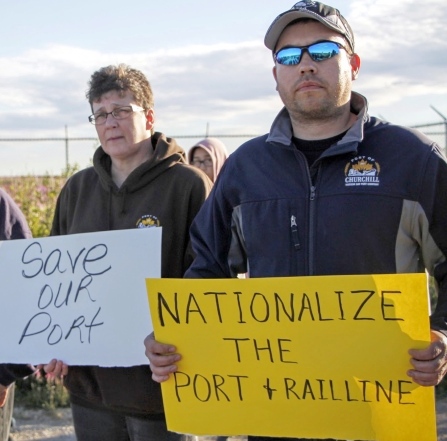 The political actions of
Canada's governments reflect
the private interests, outlook and aim of a privileged few who control
the socialized economy. The global cartels of the rich oligarchs
dominate the economy in all the basic sectors including food production
and distribution. Politics is the concentrated expression of the
economic base in
society and its social relations. The oligarchs in control of the
economy and who dominate the social relation, quite naturally in their
view, expect that government policies serve their class privilege, aim
and outlook, and not any aim or outlook of the working people and
nation-building that would challenge or restrict the control of the
oligarchs. The political actions of
Canada's governments reflect
the private interests, outlook and aim of a privileged few who control
the socialized economy. The global cartels of the rich oligarchs
dominate the economy in all the basic sectors including food production
and distribution. Politics is the concentrated expression of the
economic base in
society and its social relations. The oligarchs in control of the
economy and who dominate the social relation, quite naturally in their
view, expect that government policies serve their class privilege, aim
and outlook, and not any aim or outlook of the working people and
nation-building that would challenge or restrict the control of the
oligarchs.
How else to explain such
irrational anti-national actions as letting the sole rail line to
Churchill in Northern Manitoba fall into such disrepair that it no
longer functions while the U.S. company in control refuses to repair
it.
The same U.S. company also controls the Port of Churchill and summarily
closed it when it no longer served its private
interests. The port and rail line, among other things, were viable
options for Prairie grain farmers to ship their social product. How can
a U.S. company abuse Canadians and their economy in such a blatant
manner unless of course it is comfortably in control and unafraid of
being held to account?
Farmers Speak Out
To further illustrate how the decisions taken by
governments affect the lives of prairie farmers, in this issue Workers' Forum is publishing an
op-ed by Ken Larsen who is a member of the National Farmers Union
Region 7 (Alberta). The op-ed is titled "Helping the Railways Farm the
Farmers," and was posted on the National Farmers Union website on March
13, 2018. Larsen farms with his family west of Red Deer, Alberta
and also edits the Canadian Wheat Board Alliance website.
***
Here we go again! Some prairie farmers cannot ship
their grain. Grain companies and their friends are blaming the railways
for not getting the grain to port. After months of being lobbied, the
federal government is pushing new transportation legislation, claiming
Bill C-49 will punish the railways for neglecting grain shipments. Yet
this
legislation effectively deregulates those same railways. The railways
are quiet and the grain companies are happy. Anyone paying attention
should notice a lot wrong with this picture.
 Is it really true that prairie
grain is not moving to port? If you believe the grain companies and
their friends in the Ag Transport Coalition, the railways are ignoring
their rail car orders. Yet, the more grain the railways haul, the more
money they make, so this claim does not meet the smell test. Is it really true that prairie
grain is not moving to port? If you believe the grain companies and
their friends in the Ag Transport Coalition, the railways are ignoring
their rail car orders. Yet, the more grain the railways haul, the more
money they make, so this claim does not meet the smell test.
Measuring grain movement is a fairly simple task. The
Canadian Transportation Agency (CTA) and the independent grain monitor,
Quorum Corp. are objective sources of information. Every December the
CTA audits the railways and looks at how much export grain they move
annually. As of December 31, 2017 the railways
moved 43.2 million tonnes of grain to port, up 6.9 per cent
compared to 2016 -- more grain than ever. Not bad for a fall and
early winter with record rain and snow in the six mountain ranges
between the prairies and the west coast!
On March 6, 2018 Quorum reported, "Year to
date Western Canadian shipments from port terminal elevators at
Week 30 are 5 per cent lower than the same period last year and
one per cent lower than the 5-year average." While almost rounding
errors, one per cent less is still a lot of tonnage, however,
remembering India
imposed high tariffs on Canadian pulse exports, it is no surprise
overall shipments are slightly lower.
The numbers show the railways are doing a good job of
moving grain to port. That has not changed in the last three months,
let alone the past year. Is the constant buzz from some farm groups
that should know better simply a reaction to individuals who can't
deliver to their local elevator? Since the system is delivering enough
grain to port,
we must conclude that grain companies are ordering cars based on
priorities other than meeting local farmers' requirements.
Why? Grain companies can use local car shortages as an
excuse to pay farmers less for their grain. They get away with it
because almost two-thirds of prairie delivery points are served by just
one grain company, making farmers captive to the company at the closest
delivery point.
More than one farmer has heard something like the
following from an elevator agent shedding crocodile tears: "We're so
sorry the price is down and you've heard how the railways are not
moving the grain, but I've got a little space in my elevator if you
need the money and can live with the higher basis." Dazzled by the
pseudo-economic
term "basis," the farmer sells for less and the grain company pockets
the difference.
 When the farmer-controlled
Canadian Wheat Board (CWB) was responsible for selling grain it
optimized the system to return the maximum amount of money to farmers
and organized grain shipments to maximize the shipping capacity of the
overall system. The extra money was passed back to farmers. In the last
nine years of the
CWB-controlled system, demurrage charges were near zero and usually
offset by despatch earnings for getting ships loaded ahead of time.[1] When the farmer-controlled
Canadian Wheat Board (CWB) was responsible for selling grain it
optimized the system to return the maximum amount of money to farmers
and organized grain shipments to maximize the shipping capacity of the
overall system. The extra money was passed back to farmers. In the last
nine years of the
CWB-controlled system, demurrage charges were near zero and usually
offset by despatch earnings for getting ships loaded ahead of time.[1]
Without the CWB, the grain companies are in a "no lose"
game with prairie farmers captive to their delivery points. They use
their local monopolies to maximize their own profits while blaming the
railways and charging farmers basis for any extra costs they might
incur.
By accepting the blame for plugged elevators, railways
position themselves to lobby for further deregulation. Thanks to
Ottawa, they may well be successful. With Bill C-49's amendments to the
Transportation Act
creating mile-wide loopholes for the railways, the idea any grain
company is going to offend the railways with a reciprocal
penalty or court case when they can just take it out of the farmer's
grain cheque is beyond stupid -- especially when 90 per cent of
prairie delivery points are serviced by just one railway.
Instead of deregulating the railways via Bill C-49, the
government should be clipping the grain companies' market power over
farmers through regulation. Bill C-49's amendments to the Transportation Act do nothing but
add the railways to the list of businesses "farming the farmers." Since
the CWB was killed, the grain companies are
smiling all the way to the bank and the amended Transportation Act will soon let
the railways join them -- unless the Senate provides sober second
thought.
Note
1.
demurrage: 1a a rate or
amount payable to a shipowner by a charterer for failure to load or
discharge a ship within the time agreed. b a charge for a similar detention
of railway cars or other goods. (Oxford
Dictionary
of
Canadian
English)

PREVIOUS
ISSUES | HOME
Website: www.cpcml.ca
Email: office@cpcml.ca
|

